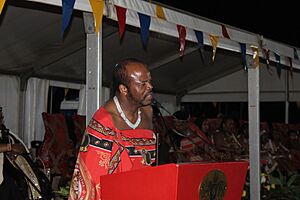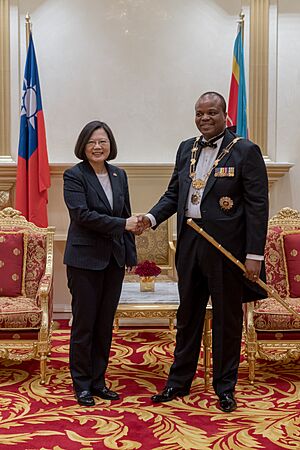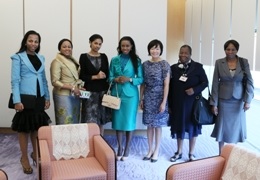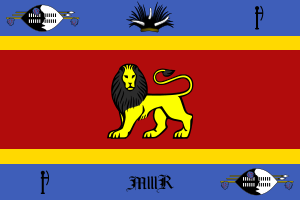Mswati III facts for kids
Quick facts for kids Mswati III |
|
|---|---|
| Ngwenyama | |
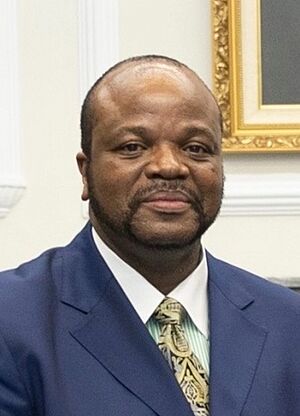
Mswati III in 2024
|
|
| King of Eswatini | |
| Reign | 25 April 1986 – present |
| Coronation | 25 April 1986 |
| Predecessor | Sobhuza II |
| Born | Makhosetive Dlamini 19 April 1968 Raleigh Fitkin Memorial Hospital, Manzini, Swaziland Protectorate |
| Spouse |
16 wives concurrently
Nomsah Matsebula
Sindi Motsa Sibonelo Mngometulu LaNgangaza (Carol Dlamini)
(m. 1987)Putsoana Hwala Delisa Magwaza
(m. 1993)LaGija (Angela Dlamini)
(m. 1998)Senteni Masango
(m. 2000; died 2018)Nontsetselo Magongo
(m. 2002)Zena Mahlangu
(m. 2002)Noliqhwa Ayanda Ntentesa
(m. 2005)Nothando Dube
(m. 2005; died 2019)Phindile Nkambule
(m. 2007)Sindiswa Dlamini
(m. 2012)Siphelele Mashwama
(m. 2019)Nomcebo Zuma
(m. 2024) |
| Issue | 45 children |
| House | Dlamini |
| Father | Sobhuza II |
| Mother | Ntfombi Tfwala |
| Religion | Christianity |
| Signature |  |
Mswati III (born Makhosetive Dlamini on April 19, 1968) is the king of Eswatini, a country in Southern Africa. As the Ngwenyama (which means Lion), he is the head of the Swazi royal family.
Eswatini is an absolute monarchy. This means the king has the final say in all government decisions. He was crowned on April 25, 1986, when he was only 18 years old. At the time, this made him the youngest ruling monarch in the world.
King Mswati III holds a lot of power. He is in charge of the military and police. He also has great influence over all parts of the government. Along with his mother, Queen Ntfombi, he is the last absolute monarch in Africa.
During his rule, there have been limits on political activities. Political parties were banned in 1973 by his father. Although a new constitution was introduced in 2005, people have continued to ask for more democratic freedoms. Starting in 2021, there were many protests for democracy. The government also has strong control over the country's TV and radio stations.
In 2018, King Mswati III officially changed the country's name from Swaziland to Eswatini.
Contents
Early Life and Rise to Power
Mswati III was born in Manzini, Eswatini. His father was King Sobhuza II, who had many wives and children. His mother is Ntfombi Tfwala, one of King Sobhuza's younger wives.
When King Sobhuza II died in 1982, a special council chose the 14-year-old Prince Makhosetive to be the next king. He was officially introduced as the crown prince in 1983. He was crowned king on April 25, 1986, just after his 18th birthday.
Reign as King of Eswatini
As the king, Mswati III has the power to choose the prime minister and other important government leaders. However, he often gets advice from his mother and a council of elders when making these big decisions.
His father had closed down the country's parliament. Mswati III decided to bring it back, but he still holds the most power. Some members of parliament are elected, while others are appointed directly by the king.
In 2006, a new constitution was created. It included rights like freedom of speech. However, some groups like Amnesty International have said that these rights are limited in real life.
International Relations
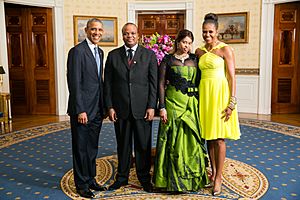
King Mswati III has built relationships with countries around the world. He has visited Taiwan many times and has promised to continue the relationship between Eswatini and Taiwan.
Eswatini is a mostly rural country, and many of its people live in poverty. The country's economy is controlled by a small group of business people, including investors from South Africa.
In 2021, King Mswati III became ill with COVID-19. He later thanked Taiwan for sending medicine that helped him recover.
Pro-Democracy Protests
In June 2021, protests began across Eswatini. People demanded more democracy and less power for the king. There were rumors that the king had left the country, but the government said these were not true.
Family and Succession
King Mswati III has several wives, which is part of a tradition called polygamy. His first two wives are chosen for him by national councillors.
The rules for who becomes the next king are very specific. The king is not chosen because he is the oldest son. Instead, the king is chosen based on who his mother is. A Swazi saying explains this: Inkhosi, yinkhosi ngenina, which means "a king is king through his mother."
Renaming the Country
On April 19, 2018, King Mswati III announced that the country of Swaziland would be renamed Eswatini. The change happened on the 50th anniversary of the country's independence from Britain.
Eswatini was the original name for the area before it was colonized. The king said the name change was a way to move on from its colonial past.
Honours
National
 Eswatini: Grand Master of the Royal Order of King Sobhuza II (1986).
Eswatini: Grand Master of the Royal Order of King Sobhuza II (1986). Eswatini: Grand Master of the Royal Order of the Great She-Elephant (2002).
Eswatini: Grand Master of the Royal Order of the Great She-Elephant (2002). Eswatini: Grand Master of the Royal Order of the Crown (2002).
Eswatini: Grand Master of the Royal Order of the Crown (2002). Eswatini: Grand Master of the Royal Family Order of Mswati III (2002).
Eswatini: Grand Master of the Royal Family Order of Mswati III (2002). Eswatini: Grand Master of the Military Order of Swaziland (2002).
Eswatini: Grand Master of the Military Order of Swaziland (2002). Eswatini: Grand Master of the Order of the Elephant (2018).
Eswatini: Grand Master of the Order of the Elephant (2018).
Foreign
 United Kingdom: Knight of the Venerable Order of St John (11 November 1991).
United Kingdom: Knight of the Venerable Order of St John (11 November 1991). South Africa: Knight Grand Cross of the Order of Good Hope (August 1995).
South Africa: Knight Grand Cross of the Order of Good Hope (August 1995).
See also
 In Spanish: Mswati III de Suazilandia para niños
In Spanish: Mswati III de Suazilandia para niños
- Without the King, a 2007 documentary film about Mswati III and his daughter, Princess Sikhanyiso.
Images for kids
-
Mswati with Japanese Prime Minister Shinzo Abe on 21 October 2019
 | Kyle Baker |
 | Joseph Yoakum |
 | Laura Wheeler Waring |
 | Henry Ossawa Tanner |


